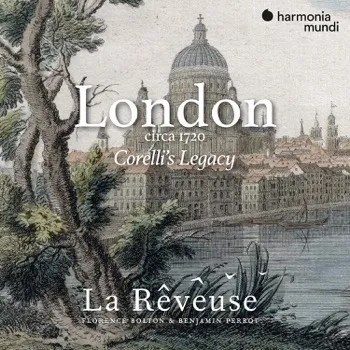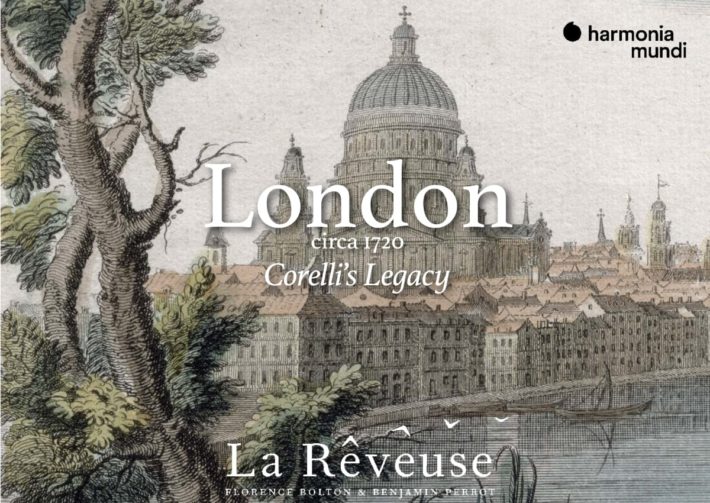This is La Rêveuse’s second in a series that explores music around London in the 1700s, a time they aptly mention as “rich in artistic experiments and inventions.” As in their well-received first installment (‘London Circa 1700’, featuring works by Purcell and his contemporaries), we get an illuminating view of the Baroque era, but this time into aspects of Arcangelo Corelli’s influence on the Concerto Grosso genre, among others.

William Babell (1690-1723) was known as a successful harpsichordist and arranger. His original compositions, such as Concerto No. 2 for Sixth Flute (tracks 1-3) also show us his skill in ensemble writing. La Reveuse takes a well-balanced approach to this piece. The harpsichord accompaniment lets the string and wind soloists shine but also adds depth in the slower moments and rhythmic drive in the faster ones. In the opening movement, I noted the beautiful playing from the violins; a transparent tone in the single and double passages gives the opening movement its finesse.
The second movement marks the arrival of the sixth flute. Although it is naturally a little more piercing than the violins, the soloist does well in toning down the instrument’s sonic edge to align with the strings’ sensitivities. The final movement is where the flute really brings out Babell’s virtuosic and elegant style. The soloist integrates a crystalline tone in the overall fluidity of the lines; the small turns and trills are clean and also add a delightful crispness (certainly doing justice to the composer himself, who was renowned for his mastery in extemporaneous ornamentation).
The homage to Corelli would not be complete without Johann Schickhardt’s Sonata IV Op. 6 (tracks 8-11), an arrangement based on two of Corelli’s Op. 6 Concerti Grossi. This is a thoughtful performance with much attention paid to details: the synchronicity of the winds throughout is faultless and delicately calibrated: the lower line gives body and dimensionality to the melody. (As an interesting reference, Corelli’s original version features strings rather than winds in the first movement’s opening – while the sound is fuller and denser, the wind version has an airy translucence).
The performers also approach the alternating tempos in this movement sensibly. I found the handoff between the lyrical slow sections and the animated ones smooth and cohesive. Like most of the selections on the album, there is a pristine clarity not just from the soloists but across the ensemble. In the second movement, for example, there are distinctly perceptible layers of sound from and within the winds, strings, and harpsichord; even in the accompanimental keyboard part, we can still hear each well-executed ornament.
Handel’s Sonata per la viola da gamba (tracks 20-22) is the only work that is less successful. Unfortunately, the sound balance is off: the viola da gamba and harpsichord are too equally present, hampering an otherwise fine rendition of the individual parts. If one can listen past this issue, the piece features a lively and intricate conversation between the instruments.
La Rêveuse also includes arrangements of famous vocal works of the time. ‘Spera, sì, mio caro bene (track 24) from Handel’s Admeto was transcribed in the 1730s (most likely by bassoonist Pietro Chaboud) for flute and small chamber orchestra – a reflection of the growing popularity to downside the vocal genre into a domestic setting. The ensemble reflects this historical context by incorporating subtleties in dynamics that would indeed be effective in an intimate space. The ritornellos bring out a warm sound quality, and the clear baselines play an integral role in adding textural complexity. The episodes between the ritornellos go beyond a focus on the soloist: we hear a vivid partnership between the wind and strings (2:10-2:23) that enables us to appreciate the counterpoint.
The liner notes are helpful but somewhat limited: there’s a lengthy discussion of the historical context of the program but less in-depth information on each composition, which will disappoint some curious listeners. The performance itself, though, is worth a dedicated listen. Warmly recommended.
“London Circa 1720 – Corelli’s Legacy
Works by Babell, Geminiani, Corelli, Handel, Schickhardt
La Rêveuse
Benjamin Perrot, Florence Bolton
Harmonia Mundi, CD HMM 905322




















